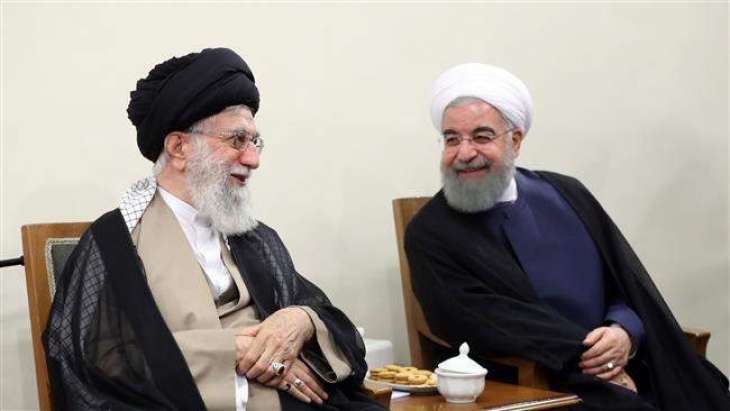The perceived Iranian threat, a focal discourse in the Middle East for months now, has brought about opinions that it might foster rapprochement between Arab states and Israel, but despite this potential detente, the costs of such an alliance would be disproportionately higher than its benefits, experts told Sputnik
MOSCOW (Pakistan Point News / Sputnik - 19th August, 2019) The perceived Iranian threat, a focal discourse in the Middle East for months now, has brought about opinions that it might foster rapprochement between Arab states and Israel, but despite this potential detente, the costs of such an alliance would be disproportionately higher than its benefits, experts told Sputnik.As Arab-Israeli talks steadily intensify in terms of both frequency and publicity, they appear to be encouraged and supported by a third party the United States. Experts believe that by ganging up on a common enemy, Iran, these long-time rivals could be preparing grounds to justify potential military intervention in the Gulf, timed ultimately to the eve of 2020 presidential election in the United States.
With these considerations at hand, one might wonder to what extent the externally induced detente might eventually result in an alliance between Israel and the Arab world, and what it could mean for Iran.
OVERLAPPING INTERESTS DO NOT AMOUNT TO ALLIANCE
Iran's regional policies, particularly its support for non-state militant actors, entrenchment attempts in Syria and Iraq and its nuclear ambitions, constitute a central security threat both for Israel and the Arab Sunni monarchies, Moran Stern, an adjunct lecturer at the Program for Jewish Civilization in Georgetown University's Edmund A. Walsh School of Foreign Service, told Sputnik.
"It can be said that Iran has certainly facilitated a convergence of interests between Israel and the Arab Sunni monarchies Saudi Arabia, the United Arab Emirates and Bahrain. Cooperation is mostly restricted to some intelligence sharing on Iran, although some trade exists too," Stern said.
Deterring what the Arab states and Israel believe to be an Iranian threat is an overlapping interest and therefore something that harmonizes Arab-Israeli relations and could facilitate dialogue, but such an alliance is not something that will happen soon, Abdulaziz Alghashian, a Middle East expert and PhD researcher of international relations and the politics of the Middle East at Essex University, told Sputnik.
It is a fact that Iran is within the common focus of attention among both Arab states and Israel, the expert said, while also wondering to what extent these nations need such an alliance.
"Let's not forget the history of the animosity that they have, but also that it is far more costly for these states to establish relations or have an alliance with Israel then it would benefit," Alghashian said.
An alliance is a very particular form of cooperation that is defined by its contractual, obligatory nature, which in practice would mean that if Israel were to attack Iran somehow, the United Arab Emirates (UAE) would be contractually obligated to respond in Israel's defense, the expert explained.
"This is very far-fetched," he added.
In the meantime, Stern added that the Gulf monarchies were unlikely to engage in any formal and open relations with Israel as long as the Palestine issue remained unresolved.
According to the expert, the importance of the Palestinian issue was particularly evident during the recent US-sponsored economic conference in Bahrain, during which Arab states voiced cordial rhetoric regarding Israel's legitimacy they want to push Palestine forward in the peace process so that they can go ahead with pursuing strategic relations with Israel as well.
"As a close ally of all sides and under an administration whose goals are to renegotiate the nuclear agreement between Iran and the P5+1 [five permanent members of the UN Security Council plus Germany] and amend Iran's regional policy through maximum pressure, America has a clear interest in facilitating closer coordination between Israel and the Gulf monarchies over Iran. This serves America's broader Middle East foreign policy architecture as [US President Donald] Trump sees it," Stern said.
Like its Arab allies in the Gulf, the United States also has a major interest in energy security. Most of the world's oil passes through the Persian Gulf, and disruptions to oil transit push global prices up. It is, therefore, not surprising that Israeli Foreign Minister Yisrael Katz, during his latest visit to the UAE, acknowledged the role of his country in assisting local players, as well as the United States and the United Kingdom, in ensuring maritime security in the Gulf.
UNITED STATES ENCOURAGES ARAB-ISRAELI DIALOGUE
Since the Warsaw Conference on Middle East Security last February, interaction between the UAE and Israel, in particular, intensified in form of secret talks, Hooshang Amirahmadi, a professor of the Edward J. Bloustein School of Planning and Public Policy at Rutgers University and president of the American Iranian Council think tank, told Sputnik.
"A change is the inclusion of the United States in these talks, showing that the Arab state [UAE] is willing to take risk of the talks with the Jewish state becoming public, a rather brave policy change," Amirahmadi said.
The expert's observations suggest the United States has engaged several of the participating states in a further military buildup in the Gulf strengthening its "maximum pressure" campaign against Tehran.
"The United States will ask both Israel and the United Arab Emirates to further cooperate against Iran in the region, encouraging them to become bolder and more aggressive," Amirahmadi said.
He added that Washington would likely ask these two states to stand up for sanctions in order to increase the economic pressure on Iran.
"It is also possible that the meeting between the Arab and the Jewish states are military in nature, designed to prepare the two for a possible military strike by the US against Iran in some near-future time closer to the US presidential elections," Amirahmadi suggested.
According to the expert, Washington could have already offered the two states incentives, such as military hardware, in exchange for them to act against Iran when the need arises in the future.
Either way, the developments do not look good for Tehran and are most likely to result in a further escalation, the expert added.




